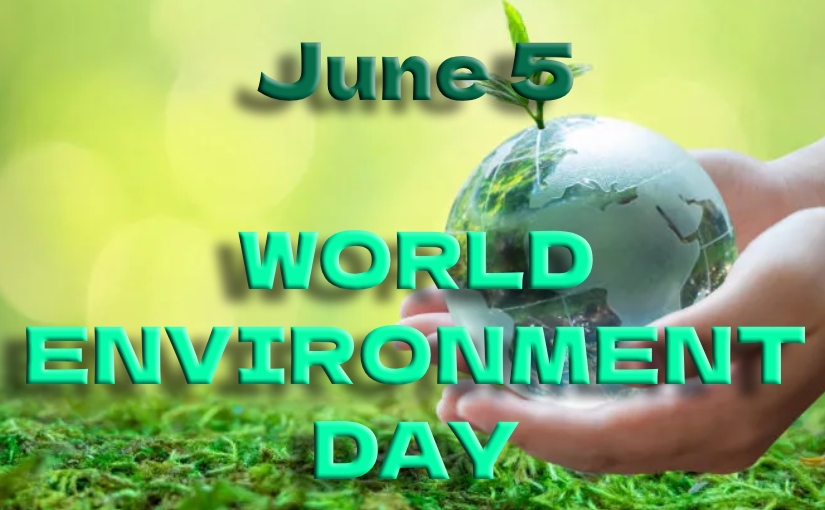World Environment Day is not merely a day to mark on our calendars; it’s a crucial reminder of our responsibility towards the planet we call home. As we celebrate the beauty and bounty of nature, we must also confront the harsh reality of environmental degradation. Climate change, pollution, deforestation – these are not distant threats but pressing challenges demanding urgent action.
This World Environment Day, let us pledge to do more than just pay lip service to conservation efforts. It’s a call to action for individuals, communities, and governments worldwide to commit to sustainable practices, preserve biodiversity, and safeguard our ecosystems. Whether it’s reducing our carbon footprint, advocating for policies that protect the environment, or simply reconnecting with nature, every action counts.
As we commemorate World Environment Day, the spotlight shines on the pressing issues confronting our planet. It’s not just a symbolic gesture but a rallying cry for concrete action.
To ensure a memorable day at The Interview World, we are thrilled to present the expertise of Inder Kumar Kapila. Formerly an engineer and now an esteemed advocate, Kapila has extensive experience practicing before both the National Green Tribunal and the Supreme Court. He sheds light on pressing environmental challenges, offers valuable insights into striking a balance between development and nature, and passionately advocates for individuals to adopt sustainable consumer behaviors to minimize impact on the environment.
Q: How can we identify and address the critical environmental challenges currently facing humanity?
A: Humanity’s journey is marked by a perpetual cycle: we innovate solutions to our problems, only to find that these solutions often breed new challenges. This cycle of problem-solving begets further complications, perpetuating a pattern where each intervention in nature, however well-intentioned, carries unforeseen consequences.
Central to this issue is our limited understanding. We often lack the foresight to anticipate the long-term impacts of our interventions. What appears as a solution today may manifest as a problem tomorrow, unbeknownst to us.
Consider the case of plastic, once hailed as a revolutionary material for its versatility and convenience. Over time, we discovered its dark side: its composition includes chlorofluorocarbons, contributing to ozone layer depletion and exacerbating global warming. This serves as a stark reminder that every interaction with nature carries environmental repercussions, even if they may initially seem advantageous.
Our blindness to these consequences stems from a combination of factors: perhaps we overlook the downsides, or worse, we remain unaware of the potential harm we inflict upon the environment. Thus, it becomes imperative to acknowledge the inherent risks in our interventions and strive for a more comprehensive understanding of their implications.
Q: How can developed societies effectively mitigate and prevent environmental damage to Mother Earth?
A: Respect the natural order of things. Why seek to cultivate apples where the conditions don’t support their growth? Understanding that the environment plays a pivotal role in nurturing plants and fruits, you wouldn’t attempt to plant seeds in infertile soil.
Recognize that each region of the Earth sustains growth according to its own inherent conditions. For instance, dates thrive in desert climates but not in the Himalayas.
Let’s take a lesson from nature rather than challenging its wisdom.
Q: How can we promote a human-friendly world while maintaining a balance between development and nature? What strategies or policies do you recommend for achieving this equilibrium?
A: Let’s take a moment to scrutinize our consumption habits. If we reflect on the practices of our parents and grandparents regarding the use of goods, we’ll notice their penchant for extracting maximum value from every item. In stark contrast, contemporary generations exhibit a trend of reckless material consumption. In the past, appliances like televisions and refrigerators endured for over two decades; today, however, people frequently replace these electronic devices, contributing to the accumulation of e-waste. Such consumer behavior poses a grave threat to our environment. We must adopt a mindset of consuming less to mitigate waste production.
Q: How can individuals actively mitigate environmental degradation in their daily lives?
A: I suggest aiming for minimal consumption. Whether it’s water, energy, clothing, or food, use only what you truly need, without excess. This mindful approach allows nature to thrive. By consuming less and saving more, individuals committed to environmental preservation can adopt a lifestyle of reduced consumption.
Q: How is consumer behavior shaping environmental trends in today’s society?
A: I’ve provided two illustrations already. Firstly, consider your mobile phone. Avoid frequent replacements to conserve resources. Secondly, minimize water usage; when washing dishes, opt for a bucket rather than running water. After use, repurpose this water for gardening. It’s imperative to alter our habits. Given the scarcity of water, conservation must be our top priority in India.
Q: How do you perceive the current challenges?
A: Indeed, upon close scrutiny, the challenge lies in safeguarding our populace from vested interests. Allow me to illustrate with a live example: the widespread adoption of Reverse Osmosis (RO) systems among urban dwellers. RO companies pose alarming scenarios about the dangers of consuming hard water, instilling panic among consumers. Consequently, they recommend setting RO systems to filter water with a Total Dissolved Solids (TDS) level as low as 100 or 150. However, such practices not only strip away essential minerals from our daily intake but also result in excessive water wastage, exceeding 30%.
A low TDS level not only compromises bone health but also predisposes individuals to various diseases. Until individuals realize the detrimental effects on their health, they unknowingly harm themselves. The primary challenge we face is the rampant consumerism and adoption of Western products that offer minimal benefits to our health and the environment.
Q: How can we effectively address the impacts of climate change on geography and mitigate the threats it poses for the future?
A: The cycle persists: we create a problem, scramble to find a solution, only to inadvertently spawn new problems in the process. This relentless pattern breeds a myriad of interconnected issues, exacerbating the complex web of challenges we face, including those stemming from climate change.



